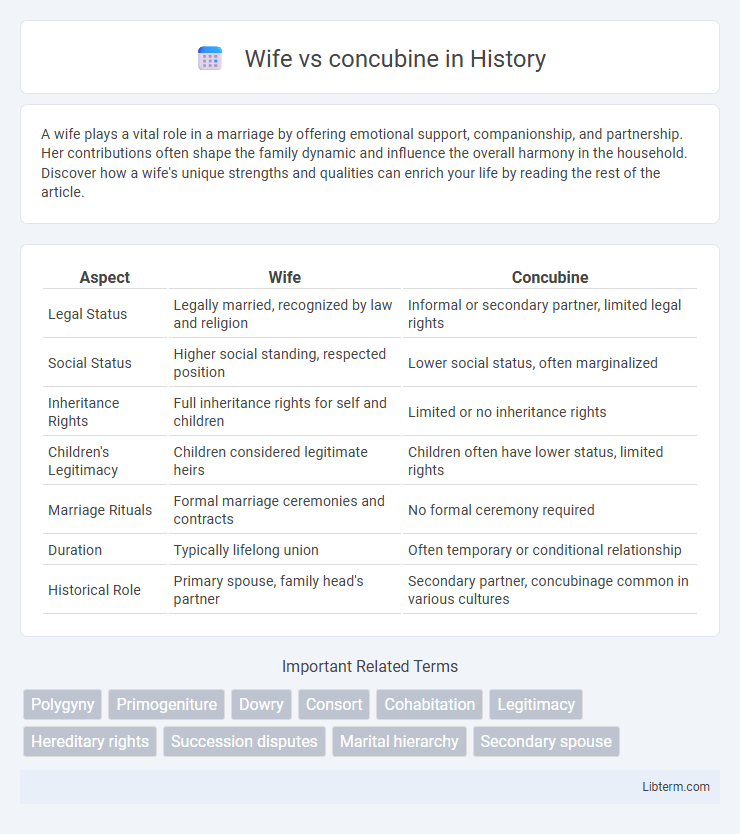A wife plays a vital role in a marriage by offering emotional support, companionship, and partnership. Her contributions often shape the family dynamic and influence the overall harmony in the household. Discover how a wife's unique strengths and qualities can enrich your life by reading the rest of the article.
Table of Comparison
| Aspect | Wife | Concubine |
|---|---|---|
| Legal Status | Legally married, recognized by law and religion | Informal or secondary partner, limited legal rights |
| Social Status | Higher social standing, respected position | Lower social status, often marginalized |
| Inheritance Rights | Full inheritance rights for self and children | Limited or no inheritance rights |
| Children's Legitimacy | Children considered legitimate heirs | Children often have lower status, limited rights |
| Marriage Rituals | Formal marriage ceremonies and contracts | No formal ceremony required |
| Duration | Typically lifelong union | Often temporary or conditional relationship |
| Historical Role | Primary spouse, family head's partner | Secondary partner, concubinage common in various cultures |
Historical Context: Origins of Wives and Concubines
The roles of wives and concubines originated in ancient civilizations where marriage laws and social hierarchies dictated their distinct statuses. Wives typically held formal, legally recognized positions with rights to inheritance and social legitimacy, while concubines were often secondary partners without legal marriage but maintained for companionship or political alliances. This distinction is documented in societies such as Ancient China, Mesopotamia, and Egypt, reflecting diverse cultural practices surrounding family structure and lineage.
Legal Status: Marriage Versus Concubinage
Wives hold a legally recognized status through formal marriage, granting them spousal rights such as inheritance, property ownership, and marital decision-making. Concubines, lacking official marriage, possess limited or no legal protections, often dependent on the acknowledgment by the male partner. Legal distinctions between wives and concubines significantly affect social standing, financial security, and parental rights.
Social Roles and Expectations
In historical and cultural contexts, wives held legally recognized social roles with rights to inheritance, social status, and legitimacy of offspring, whereas concubines occupied subordinate positions without equivalent legal or social privileges. Wives were expected to manage household affairs and uphold family lineage, while concubines often served primarily for companionship or bearing children, lacking formal recognition. These distinctions reinforced societal hierarchies, influencing women's rights, family structure, and social expectations within patriarchal systems.
Rights and Privileges: Wife Compared to Concubine
Wives possess legally recognized rights such as inheritance, divorce protections, and official societal status, granting them privileges like social recognition and security. Concubines typically lack formal legal status, resulting in limited rights regarding property, inheritance, and social acknowledgment. The disparity in rights and privileges reflects the wife's established role in family law and societal norms, while concubines often remain marginalized or dependent on the husband's discretion.
Inheritance and Lineage Implications
Wife status traditionally secures recognized inheritance rights for offspring, ensuring legitimate succession and property transmission according to legal and cultural norms. Children of concubines often face limited or disputed inheritance claims, reflecting lower social legitimacy and exclusion from formal lineage recognition. This distinction significantly impacts familial wealth distribution and the continuity of dynastic or family lineages.
Emotional Dynamics: Affection, Jealousy, and Rivalry
Emotional dynamics between a wife and concubine often center on affection disparities, where the wife may experience diminished emotional security due to the husband's divided attention. Jealousy frequently arises as both parties vie for the husband's favor, intensifying feelings of rivalry and competition within the household. This complex interplay shapes interpersonal relationships, influencing overall family harmony and psychological well-being.
Religious and Cultural Perspectives
In many religious traditions, such as Islam and ancient Chinese practices, wives hold a higher spiritual and social status compared to concubines, who often occupy a subordinate role without equal inheritance rights. Cultural norms in these societies typically emphasize the wife's central role in lineage, family legitimacy, and ritual purity, whereas concubines primarily serve to bear children or provide companionship. This distinction influences marital laws, inheritance customs, and religious ceremonies, reinforcing the hierarchical roles within the family structure.
Depictions in Literature and Media
Literature and media often portray wives as legally and socially recognized partners with rights and status, while concubines are depicted as secondary figures with ambiguous social roles. Historical novels and dramas highlight the power dynamics, emotional conflicts, and societal tensions between wives and concubines, emphasizing themes of loyalty, jealousy, and hierarchy. Visual media like films and television series frequently explore the cultural and gender implications, illustrating the contrast between official marriage and informal relationships.
Modern-Day Relevance and Transformations
In contemporary society, the roles of wife and concubine have undergone significant transformation, with legal systems worldwide predominantly recognizing only monogamous marriage, thus relegating concubinage to cultural or historical contexts. Modern legal frameworks emphasize spousal rights, inheritance, and social status exclusively for married partners, reflecting shifts in human rights and gender equality standards. The evolving perception challenges traditional hierarchies, promoting partnerships grounded in mutual respect, consent, and equality rather than hierarchical polygamy or concubinage.
Ethical Debates Surrounding Polygamy and Concubinage
Ethical debates surrounding polygamy and concubinage often focus on issues of consent, equality, and human rights, emphasizing the potential for exploitation and power imbalances between a wife and concubines. Critics argue that concubinage can perpetuate social and legal inequalities, as concubines typically lack the legal protections and social status afforded to wives. Advocates for monogamous marriage highlight concerns about emotional well-being and gender justice, advocating for the protection of women's autonomy and equal treatment under the law.
Wife Infographic

 libterm.com
libterm.com